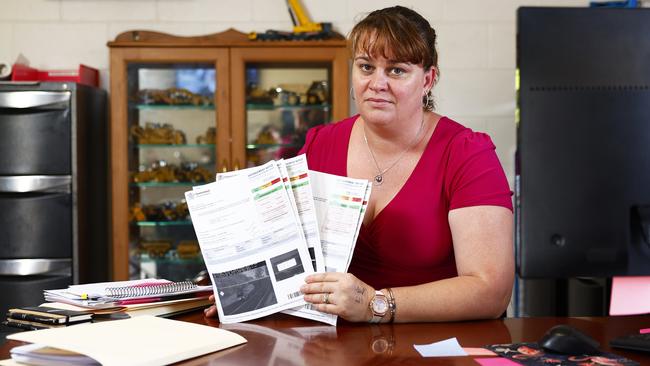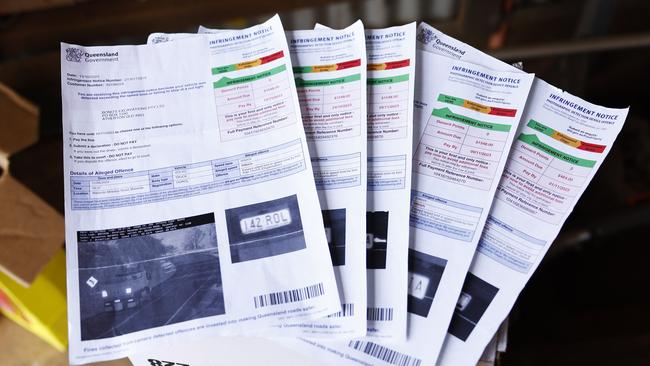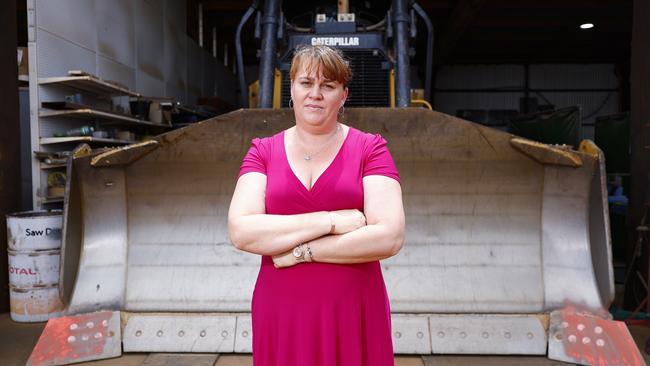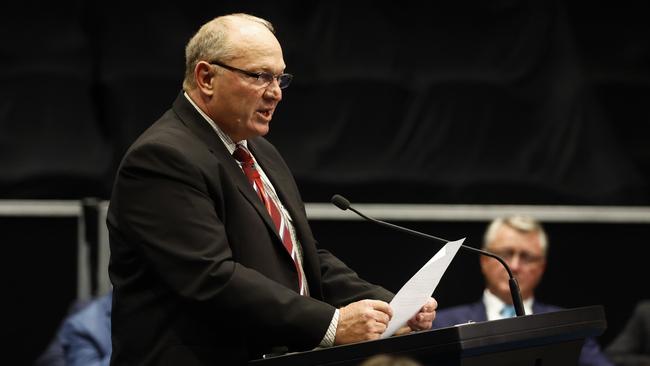‘Revenue raking’: Small town speed blitz nabs $300k in three months
The state government has been accused of focusing on revenue over safety after a speed camera blitz that has seen 400 people hit with 600 fines since September.

Police & Courts
Don't miss out on the headlines from Police & Courts. Followed categories will be added to My News.
A controversial Far North Queensland speed camera blitz which left locals with multiple fines at once, losing their licenses and in thousands of dollars in debt has prompted calls for a Ministerial inquiry.
Despite having a population of only about 2500, more than 400 people have received more than 600 fines worth more than $300,000 in the small town of Malanda since the Transport and Main Roads deployed a transportable road safety camera there in September.
But local MP Shane Knuth has raised concerns about the calibration of the camera, and also questioned why it was deployed to a 60km/hr location which has a minimal crash history.
The camera is placed in the 60km/h zone, about 350m away from where the speed changes to 80km/h.
“This device was situated just outside a small township of 2500 so the sheer number of fines is extraordinary,” Mr Knuth said.
“Not only have I questioned the accuracy of the device but I have also questioned why it was placed at a location where there is an incline and little evidence of speed related crashes, both of which contravenes Queensland Government policy on placement of these devices.
“The reality is that this device is not about saving lives, it is about raking in revenue.”
The Sunday Mail can reveal the TRSC was one of 10 TMR have deployed in regional and rural areas since July, with a department spokeswoman saying they were introduced as an alternative to relying on police officers.

“TRSC were introduced specially for enforcement in regional and rural areas because statistics and research demonstrate that people in these areas are disproportionately affected by crashes and speed related fatalities,” she said.
“The previously available methods of speed enforcement primarily relied on uniformed police officers.
“In regional and rural areas, these officers have many demands on their time to properly serve the community, in addition to road safety. Any solution that enables safety to be prioritised as well as freeing up uniformed officers to serve the community is a benefit to everyone.”
Mr Knuth has called for Mr Bailey to launch an inquiry into the procedures and use of unmanned TMR mobile speed camera trailer devices following the sheer amount of fines, and a calibration certificate obtained from TMR showing it was last checked in April.
Transport Minister Mark Bailey confirmed the camera had detected hundreds of drivers over the limit - including 342 travelling at more than 20 km/hr over the 60km speed limit.
He also said since 2018, there had been four crashes to which police were called - with two people treated in hospital, and two with minor injuries.
Mr Knuth said he had been contacted by motorists who had confirmed some fines had been refunded.
“This has been done without any explanation,” he said.
“I also received valid documentation from a motorist - who wishes to remain anonymous - who works for a government department, whose IVMS device fitted to their work vehicle shows they were travelling 56km/h at the exact date and time his infringement notice shows they were clocked at 68km/h.

“All of this evidence to me casts serious doubts over the validity of the fines issued and the accuracy of this device and demands an official investigation.
“This community has been hit hard by what I firmly believe is a malfunctioning device and they are rightfully asking questions.”
Mr Bailey insisted the cameras deployed to the regional and rural areas were working correctly.
‘Given the largest number of fatalities in over a decade recorded last year, it is disappointing to hear state MP’s suggesting spurious claims about speed camera accuracy instead of sending out a clear and strong road safety message condemning speeding given the higher level of fatalities in regional and rural areas compared to urban areas,” he said.
“Several validations and checks are undertaken, prior to infringements being issued from TRSCs.
“These include independent testing and calibration of the speed camera annually as required by legislation, secondary validation of the speed camera’s accuracy at each deployment, calculated verification of the offences and manual adjudication of the offences prior to an infringement being issued.”

Businesswoman Cirsty Kidner Bonadio now owes TMR more than $6500 after she and her drivers clocked up five separate fines in just one week.
It took almost a month, however, for the business to receive all the fines.
“Why the hell weren’t these fines sent out sooner? They should be onto it much sooner,” she said.
“If people knew on a quicker time frame that they were speeding than you can correct your actions
“It’s hard enough running a business without and expense like that coming out of left field
“It (the fines) is absolutely crazy, especially in these times where everyone is struggling to make ends meet.”
The Sunday Mail has spoken with a number of locals including nurses and pensioners who have received multiple fines - ranging from five to eight - in the post at the same time, with some not only having thousands owing but at risk of losing their licence.
A TMR spokeswoman said the time difference between the speed detection and the issuing of an infringement “is because each infringement is manually reviewed for accuracy.”
“Following the speed limit is the best and easiest way to avoid any infringements, whether a first or subsequent infringement,” she said.
“Currently, the law requires camera detected offences to be issued to the registered operator of the vehicle by post.
However, this does not change motorists’ responsibility to drive within the speed limit at all times.”


